The Use of the Term phantasma in Latin Literary Sources: From Early Records to Late Roman Christian Authors
Abstract
Ghosts are the cultural product of a series of beliefs that stem from the existence of a dissociated numen that inhabits the human body. It is this separation that makes possible to conceive the autonomous presence of the spiritual entity. This ancestral type of story has been reproduced since the dawn of humanity, although this work seeks to elucidate what the connotations of use of a Greek term are, that passes into Latin and that undergoes an evolution through the filter of Christianity. Through a study of a historical-philological nature with a comparative perspective, this article aims to show the differences in use, paying special attention to the patristic texts of Tertullian and the allegorical and Christian poetry of Prudentius.
Downloads
-
Abstract503
-
PDF (Español (España))325
-
EPUB (Español (España))280
-
MOBI (Español (España))158
References
Aguirre Castro, M. 2009. Some Ghostly Appearances in Greece: Literary and Artistic Sources. Gerión. Revista de Historia Antigua 27, 179 – 186.
Aguirre Castro, M. 2006. Fantasmas trágicos: algunas observaciones sobre su papel, aparición en escena e iconografía. Cuadernos de Filología Clásica. Estudios griegos e indoeuropeos 16, 107 – 120.
Agustí Aparisi, C. 2020. Fantasmas o revenants en el medievo. Antecedentes de elementos fantasmagóricos en “El Formicarius de J. Nider”. Medievalismo: Boletín de la Sociedad Española de Estudios Medievales 30, 15 – 37.
Austin, N. 1994. Helen of Troy and Her Shameless Phantom. Myth and Poetics. Ithaca & London: Cornell University Press.
Baraz, Y. 2012. Pliny´s Epistolary Dreams and the Ghost of Domitian. Transactions of the American Philological Association 142, 105 – 132.
Bolaños López, Z. 2010. Helena soy de nombre: ¿Helena de Troya o Helena de Egipto? Revista Káñina 2, 107 – 114.
Castillo García, C. 2001. Tertuliano. Apologético: a los gentiles. Madrid: Gredos.
Collette, B. 2006. Phantasia et phantasma chez Platon. Les Études Philosophiques 76, 89 – 106.
Crowley, P. R. 2019. The Phantom Image: Seeing the Dead in Ancient Rome. Chicago & London: University of Chicago Press.
Espinosa Martínez, T. 2006-2007. Una aproximación a las creencias populares de los romanos: las Lemurias, ¿respeto o temor? Espacio, Tiempo y Forma. Serie II. Historia Antigua 19 – 20, 257 – 269.
Felton, D. 1999. Haunted Greece and Rome: Ghost Stories from Classical Antiquity. Austin: University of Texas Press.
Finucane, R. C. 1996. Ghosts: Appearances of the Dead and Cultural Transformation. New York: Prometheus Press.
García Jurado, F. 2000. Plinio y Virgilio. Textos de la literatura latina en los relatos fantásticos modernos. Una página inusitada de la tradición clásica. Cuadernos de Filología Clásica. Estudios Latinos 18, 163 – 216.
Goldstein, R. y Stroumsa, G. G. 2007. The Greek and Jewish Origins of Docetism: A New Proposal. Zeitschrift für Antikes Christentum 10 (3), 423 – 441.
Guzmán Almagro, A. 2016. Umbra feralis exercitus: ejércitos fantasma en la historia de Roma. Revista de Estudios Latinos 16, 11 – 24.
Guzmán Almagro, A. 2014. Latin Lexicon on Ghosts. FIEC Conference: http://fiec2014.sciencesconf.org/?lang=en.
Guzmán Almagro, A. 2013. Demonios, fantasmas y máscaras en la Antigüedad: consideraciones sobre el término larua y sus significados. Emerita. Revista de Lingüística y Filología Clásica 81 (1), 183 – 202.
Holmberg, I. E. 1995. Euripides’ Helen: Most Noble and Most Chaste. American Journal of Philology 116, 19 – 42.
Jansen, M. C. 2012. Exchange and the Eidolon: Analyzing Forgiveness in Euripides´s Helen. Comparative Literature Studies 49 (3), 327 – 347.
Johnston, S. I. 1999. Restless Dead: Encounters between the Living and the Dead in Ancient Greece. Berkeley – Los Angeles – London: University of California Press.
Lieu, J. M. 2015. Marcion and the Making of a Heretic. God and Scripture in the Second Century. Cambridge: Cambridge University Press.
Lillo Redonet, F. 2013. Fantasmas, brujas y magos de Grecia y Roma. Madrid: Ediciones Evohé.
López Saco, J. O. 1994. La muerte y la utopía de las Islas de Los Bienaventurados en el imaginario griego. Fortunatae: Revista canaria de Filología, Cultura y Humanidades Clásicas 6, 43 – 70.
Marcos Casquero, M. A. 1999. El supersticioso mundo de las campanas. Estudios humanísticos. Filología 21, 47 – 66.
Marlier, T. 2006. Histoires de fantômes dans l’Antiquité. Bulletin de l´Association Guillaume Budé 1, 204 – 224.
Martínez Troya, D. 2015. La dualidad demon-demonio como catalizador de la cristianización del Imperio romano. Itálica 1 (1), 13 – 28.
Ogden, D. 2002. Magic, Witchcraft and Ghosts in the Greek and Roman Worlds. Oxford & New York: Oxford University Press.
Prósperi, G. O. 2020. La cuarta persona de la Trinidad. La carne fantasmática de Cristo y la dehiscencia extra-ontológica. Revista de Filosofía 45 (2), 301 – 317.
Prósperi, G. O. 2018. Y el Verbo se hizo fantasma. La (anti)cristología docetista en el Adversus Marcionem de Tertuliano. Plura 9 (2), 128 – 145.
Romero-González, D., Muñoz-Gallarte, I. y Laguna-Mariscal, G. (eds.). 2019. Visitors from beyond the Grave: Ghosts in World Literature. Coimbra: Imprensa da Universidade de Coimbra.
Stramaglia, A. 1999. Res inauditae, incredulae. Storie di fantasmi nel mondo greco-latino. Bari: Levante Editori.
Thaniel, G. 1973. Lemures and Larvae. The American Journal of Philology 94 (2), 182 – 187.
Wilhite, D. E. 2017. Was Marcion a Docetist? The Body of Evidence vs. Tertullian´s Argument. Vigiliae Christianae 71 (1), 1 – 36.
1. The authors non-exclusively assign the exploitation rights (reproduction, distribution, communication and transformation) to the magazine.
2. The works published in this magazine are subject to the Attribution-ShareAlike 4.0 International license (CC By SA 4.0). Therefore, they can be copied, used, disseminated, transmitted and publicly displayed, provided that:
i) the authorship and the original source of its publication (journal, editorial and URL of the work) are cited, thus allowing its recognition.
ii) it is allowed to remix, transform or create from the material while maintaining the same license as the original.
Note: Articles prior to 2022 incorrectly display the CC by SA license in the abstract page. They are under a CC by NC ND license as embedded in the article pdfs. Articles published in 2022 and after are under the CC by SA license.

3. Self-archiving conditions. Authors are allowed and encouraged to electronically disseminate the pre-print (version before being evaluated) and/or post-print (version evaluated and accepted for publication) versions of their works before publication, as it favors their publication. Earlier circulation and diffusion and with it a possible increase in its citation and reach among the academic community. Color RoMEO: verde.
























